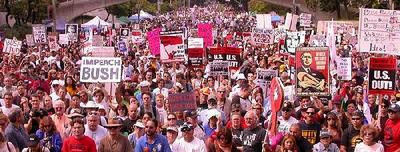
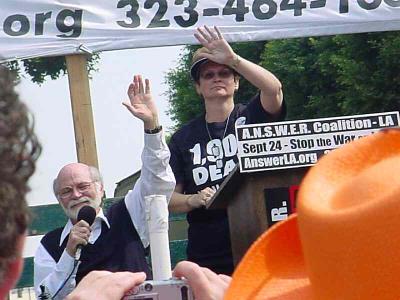
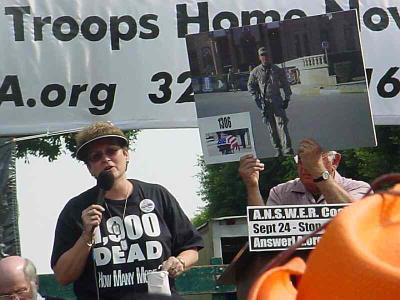
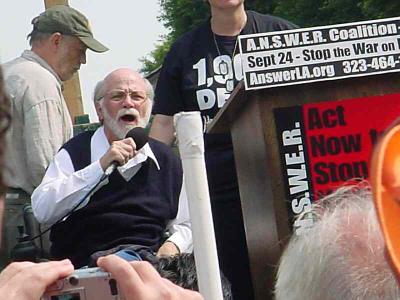
Images from anti-war protests staged on Sept.24, 2005. The article was written on July 23, 2005
PV Vivekanand
AMERICANS are angry, and the fury is growing. Soon something will have to yield, and the entire facade of the deep conspiracy and deception that went into hoodwinking them into accepting the invasion and occupation of Iraq as legitimate would collapse. That is what one realises when browsing through the thousands of websites that have sprung up to carry many objective and in-depth anayses and comments. No mainstream media are touching the real story of deception of which the unfolding details of how senior officials in the Bush administration stopped at nothing and pulled all the plugs in their desperate effort to build a non-existent case against Iraq. Exposing an undercover operative of the Central Intelligence Agency (CIA) is only one of the classic examples of the neoconservatives' desperation, writes PV Vivekanand.
It now seems to be a certainty that Karl Rove, a senior adviser to US President George W Bush, had revealed the name of the undercover CIA operative to the Time magazine as welll as columnist Robert Novak. Time magazine's reporter, Matt Cooper, has also revealed that Vice-President Dick Cheney's aide Lewis Libby was another of his sources.
Linked to the same case is Judith Miller, The New York Times reporter, who was the main conduit for then Iraqi exile Ahmed Chalabi to plant false information in the US media. Miller is being praised as a heroine for opting to go to prison rather than reveal her sources in connection with the same case although she did not write about it.
However, American writers point out, the media which have been paying tribute to Miller's "courage" are clearly overlooking the fact that she is in prison not because of a stand against revealing sources but for a different reason.
Miller is in prison to protect someone high up in the Bush administration or someone who was there. It could be anyone, including the president, the vice-president or one of their powerful aides, including some who are now occupying high international positions and a revelation that they had revealed the name of the CIA operative to a journalist could have far-reaching consequences to their present status.
Not many journalists and commentators in the US are impressed by Miller, as their comments on various websites indicate. They are asserting that if Miller were to uphold the high ethics of journalism and freedom of the press, then she should have exposed the Bush administration's deceptive campaign to wage war against Iraq.
She is well-known for her expertise with the Middle East, and it should not have been a secret to her that the administration was determined to invade and occupy Iraq much before the actual invasion and that the scene was being prepared for it through deceptive means.
A suggestion, direct or indirect, explicit or implicit, never came in any of Miller's writings in the run-up to or during or after the invasion of Iraq that Washington had made up its mind to seal Saddam Hussein's fate even when it was dilly-dallying with the UN about weapon inspections in Iraq.
Instead, she steadily helped channel to her paper a flow of unverified information — now we know it Chalabi was her source — about Saddam's non-existent weapons of mass destruction, her critics point out.
The legality of the right of journalists to protect their sources is being debated in Washington now, and several members of Congress known to have strong links with the neoconservative camp are trying to introduce legislation that offers protection to journalists who refuse to reveal their sources.
Obviously, the Rove-Libby case is only the tip of an iceberg. Much deeper and intriguing plotting and planning has gone into setting the deceptive path towards the war against Iraq. And those who want to introduce legal protection for journalists refusing to reveal sources might perhaps be ensuring protection for themselves when more skeletons tumble out from the shelves of the Bush administration.
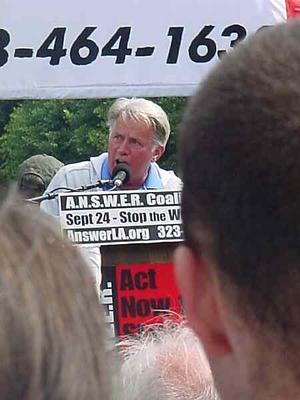
No one doubts that there was a grandiose scheme that went to paving the way for the US-led invasion and occupation of Iraq and it was helped by many media outlets which, wittingly or unwittingly, sidestepped journalistic ethics, principles or code of conduct in their anxiety to help the neoconservatives to build the case for war.
We should have known this week whether Miller was protecting Karl Rove, Lewis Libby or someone else. But it has not happened.
Time reporter Cooper has already revealed that Rove was the first to tell him that the wife of former ambassador Joseph Wilson was an undercover CIA operative and she was instrumental in sending Wilson to Niger to investigate claims that Saddam Hussein had bought nuclear material from that country.
Cooper has also disclosed that Libby was another of his sources.
Now that both Libby and Rove have been named, it was logical that Miller would opt to admit that either of them or both of them were her sources too and get herself released from prison.
Her imprisonment could last for another three months if she continues to refuse to reveal her sources. Since she did not grab the opportunity offered when Copper named Rove and Libby, she is seen as definitely protecting someone else, and this opens up yet another chapter of deception at the highest levels in Washington to set the stage for war against Iraq.
In legal terms, both Rove and Libby could be charged with treason because they exposed an undercover CIA operative. Had the woman concerned been a regular employee of the CIA, there would have no such charge, but exposing an undercover agent is a serious crime.
That a senior White House official would go to the exent of committing such a crime is only a reflection of the determination to invade and occupy Iraq, many Americans argue.
Boston Globe columnist Derrick Z. Jackson writes that the election victory of Bush in 2000 was the hardliners in Washington were waiting for in their gameplan to invade and occupy Iraq.
According to Jackson, "Libby, Cheney, and the other influential right-wing hard-liners, such as Donald Rumsfeld, Paul Wolfowitz, Richard Armitage, Richard Perle, and Douglas Feith, saw their dreams come true" when Bush was elected.
He notes that Cheney was defence secretary in the administration of Bush Senior and Libby and Wolfowitz were two of his aides who, after the first Gulf war left Saddam in power, drafted a document advocating ‘‘pre-emptive’’ war against possible threats.
They said the United States should be ‘‘postured to act independently when collective action cannot be orchestrated," notes Jackson. But their plans had to be held in abeyance because Democrat Bill Clinton won the 1991 elections and occupied the White House for the eight years beginning in January 1992.
"But when the junior Bush became president in 2000, the hard right on foreign policy took the helm," writes Jackson. "They used the terrorist attacks of Sept. 11 as an excuse for invading Iraq, even though President Bush’s own 9/11 Commission found no tie between Saddam and 9/11.
"Libby was in the thick of whipping up fear over the thinnest of evidence. The level to which Libby and Cheney stooped to get their war was highlighted by the momentous presentation of Saddam’s 'threat’' before the United Nations Security Council by then secretary of state Colin Powell.
"Powell gave a presentation six weeks before the war where he said, 'every statement I make today is backed up by sources, solid sources. These are not assertions.’ Those assertions resulted in grudging acceptance of the war from many Democrats.
"Virtually all of Powell’s solid sources fell apart when the United States turned Iraq upside down, killing thousands of Iraqi civilians in the process. He would have looked much worse had he listened to everything Libby and Cheney tried to feed him."
Jackson concludes: " Libby may end up as a symbol of a government so driven to ignore the truth it was willing to resort to dirty tricks to stop anyone from telling it."
Why was the uranium-from-Niger deception so important for the Bush administration that its senior officials went far out of their way to discredit the Wilsons?
Ambassador Wilson exposed a particular lie that played an essential role it played in the administration’s plans for war against Iraq.
Wilson pulled the rug from under the argument that Iraq was on the verge of acquiring nuclear weapons. The argument was one that the administration wanted to flash before Congress and convince it into approving war on Iraq.
Indeed, the "intelligence" on the non-existent Niger connection came from the British government, the White House's main partner, but even London had doubts over the authenticity of the information.
But it was a windfall for the neoconservative camp. The neocons charged up the spin-machine in Washington and soon it was taken for granted in the media that Baghdad was reconstituting its nuclear weapons development programme.
Then came Wilson's bombshell, and no one in the neocon camp was willing to forgive him for upsetting the war wagon going to Baghdad, and hence the former ambasasdor and his wife had to pay a big price, and they paid it indeed.
What is deplorable is the way the administration continues to play phantom and insist that it was right all along and there was nothing wrong — notwithstanding that all its justifications for the Iraq war were lies, that it led the US and some of its allies into an illegal war where thousands of American soldiers have been killed and maimed — not to mention tens of thousands of Iraqis — and spent more than $200 billion of American taxpayer's money.
What is precisely the Wilson and CIA angle to the campaign of deception and lies?
It is simple and straight.
Wilson was sent by the CIA to Africa in 2002 to investigate claims that Saddam tried to buy uranium from Niger — a claim that was central to the White House justification for its invasion of Iraq that Saddam was building nuclear-arms capability.
Wilson conducted the investigation and reported back that there was no basis whatsoever for the claim. Well, it was not what the White House wanted and he was told to keep quiet.
However, the administration continued to maintain that Saddam was seeking nuclear material from Niger. Bush himself made that claim in public in his 2003 State of the Union address.
Obviously, Wilson was shocked by the blatant deception, and wrote an op-ed piece in The New York Times critical of the administration's strategies and exposing the deceit.
Wilson's article asked the question: "Did the Bush administration manipulate intelligence about Saddam Hussein's weapons programmes to justify an invasion?"
At this point, he became an enemy of the administration, and it was time to punish Wilson for blowing the whistle and also to set an example for others like the former ambassador who had known of the campaign of deception at various levels. That punishment came in the form of exposing Wilson's wife Valery Plame as an undercover CIA operative.
Apparently, Rove suggested to Cooper that it was because of his wife's CIA influence that the former ambassador was assigned to investigate the Niger nuclear claim. The revelation was purportedly aimed at discrediting Wilson, but, in the bargain, his wife was named as a CIA undercover agent.
Obviously, the administration saw the stakes in the game as too high not to allow Wilson to get away with revealing its deceptions over Iraq and also sought to set a deterrent against others with similar thoughts. That is why someone like Rove went to the extent of exposing an undercover CIA agent that would have much deeper impact within the intelligence community. Exposing an undercover operative could lead to exposing many others. In this case, it is known that at least one "foreign undercover agent" of the CIA was executed by the host government because that agent was also exposed when Valery Plame was named a CIA agent. The damage to US intelligence operations could be vast, and no one is talking about it, at least not yet.
It should indeed be a shock to the American people that senior officials in their government were party to compromising intelligence and undermining the country's national security interests.
And we are hearing more and more from the American people expressing their anger and indignation over how they were taken for a ride in the Iraq context.
The first published account that Plame was a CIA operative came in a syndicated column written by Robert Novak, but he got off the hook by making a deal with the special prosecutor assigned to investigate the "leakage."
In his column, Novak identifed Valerie Plame as a CIA agent. He suggested that her influence had been used by Wilson to get the assignment to verify the Niger claim and torpedo the mission for his own narrow partisan ends. Novak cited as sources "two senior administration officials."
Plame was assigned to the CIA's Non-Proliferation Centre, an organisation of analysts, technical experts and former field operatives who work on detecting and, if possible, preventing foreign proliferation of weapons of mass destruction.
Novak wrote: "Vice President Cheney and his chief of staff, Lewis 'Scooter' Libby, met with officials at the Non-Proliferation Centre before the invasion of Iraq to discuss reports that Iraq was seeking to buy uranium in Africa. A US official with knowledge of those meetings said Plame did not attend. But the former US intelligence official said she was involved in preparing materials for those meetings."
Then came the Time magazine report written by Cooper revealing Plame's name and an investigation was launched into who leaked the name. What we are hearing today is the continuation of that episode.
What was Miller's "crime"? She revealed that a White House official had mentioned the name of Plame, although she did not write about it.
And when the investigation was launched, Miller refused to reveal whom she'd talked to and that was why she was sent to jail. Novak was spared because of his deal with the investigator. Cooper tried to put up a fight, but ultimately he agreed to reveal his source to a grand jury and thus avoided going to prison like Miller.
A close look at Miller's writings since Sept.11, 2001 indicates that she had contributed much to building the non-existent case for war against Iraq by accepting whatever lies were fed to her of Saddam's weapons of mass destruction. Of course, she might not have known that these were lies. But, surely, a journalist with decades of experience behind her would have definitely tried to verify some of the information. Obviously, as The New York Times had to admit later, the paper did not do justice to the mandatory process of verifying some of the reports.
But why would Miller persist in carrying the deceptive "details" that Chalabi provided her?
Well, the answer might perhaps be found in a March 18, 2002 letter revealing a conversation that took place between the former British ambassador to the US, Sir Christopher Meyer, and one of the architects of the Iraq war — Paul Wolfowitz, often described as the most hawkish among the neoconservatives who planned the Iraq war eight years earlier (in a recommendation to Israel) and implemented the plan in 2003.
Meyer wrote to British Prime Minister Tony Blair on a meeting he held with Wolfowitz:
"We backed regime change, but the plan had to be clever and failure was not an option."
It was written one year before the US launched the invasion of Iraq.
Beyond that is the direct reference that Wolfowitz made to Chalabi's Iraqi National Congress (INC).
Meyer observed in the letter that Wolfowitz insisted that the INC should not be discredited despite warnings from Meyer.
"When I mentioned that the INC was penetrated by Iraqi intelligence, Wolfowitz commented that this was probably the case with all the opposition groups: It was something we would have to live with..."
(Indeed, it was Wolfowitz who insisted that Bush include a statement that Iraq tried to buy uranium from Niger in his State of the Union address despite a CIA warning that the information was unreliable and could not be verified.
“The British government has learned that Saddam Hussein recently sought significant quantities of uranium from Africa,” Bush said in his address.
No doubt, the statement was technically correct because it accurately reflected a British intelligence report. However, the White House knew it was information that the CIA had explicitly warned might not be true.
That was the level of desperation of the Bush administration to build the false case for the war against Iraq).
Is there any connection with Wolfowitz's "obsession" with Chalabi and the false information the INC chief provided to Miller that unfailingly found its way to The New York Times?
Is Miller trying to protect Wolfowitz, who is now president of the World Bank?
The web of lies is spread far and wide. Among the officials who played a key role in creating the so-called Niger file and added it to Washington's case for war against Iraq was Under Secretary of State for Arms Control and International Security Affairs John R. Bolton , according to Representative Henry Waxman, a ranking member of the House Government Reform Committee.
The document was part of an American presentation countering and discrediting a Dec.7., 2002 Iraqi disclosure about its weapons of mass destruction programme.
On Dec.19, 2002, the State Department issued a fact sheet entitled "Illustrative Examples of Omissions from the Iraqi Declaration to the United Nations Security Council."
Under the heading "Nuclear Weapons," the fact sheet stated:
The declaration ignores efforts to procure uranium from Niger.
Why is the Iraqi regime hiding their uranium procurement?
Waxman says he was told by the State Department in September 2003 that Bolton had no role in creating the document.
However, says Waxman, there is evidence that Bolton was specifically asked for help to counter the Iraqi declaration and Bolton assigned the work to "the Bureau of Nonproliferation," a subordinate office that reports directly to Bolton.
Is Miller protecting Bolton, who is nominated by Bush to be the next US ambassador to the UN?
We don't know yet who Miller is trying to protect and we could only take a wild shot at it, but we don't have to do that to know what she is not protecting.
The fury of the American people are showing in cyberspace.
Here is a classic example (http://wuamericaru.blogspot.com):
"The current Administration has done its very best to mangle, tear asunder, or annihilate: our constitutional rights, our freedoms and liberty, our privacy, America's standing in the world, the economy, the environment and ways of protecting it, the healthcare system and Medicare, Social Security, sound education and student development, the quality and safety of the agriculture industry and our food and water supply, proper judicial procedures, the peoples' right to know what their "duly elected" government is really doing. This is just a short list.
"The way in which the administration has imposed its whims and will over the entire country — and certain parts of the world that don't need mentioning — in a seemingly carte blanche manner, is very frightening and disturbing. It is troubling that a country founded on a premise and a philosophy of democratic, citizen-run government can devolve into a shell of its former self, with dangerous, avaricious, and bloodthirsty individuals and groups filling the void. On the outside, everything looks peachy keen. When one gets to the heart of the matter, however, they can see the slow, painful, and agonising death of the greatest country that ever was."
Justin Raimundo, a well-known anti-war activist and commentator, puts in a better perspective (www.antiwar.com/justin):
"What we are witnessing is an insurgency arising to take back Washington from the occupiers. It is a two-pronged legal assault, launched from within the FBI and the Department of Justice by patriotic Americans who mean to take back their country from the invader. That is the meaning of the Plame investigation and the AIPAC-Larry Franklin spy case. The battlefield is not Baghdad, it's an American courtroom: the weapon of choice is not the RPG but the subpoena. As the prosecutor-insurgents inch slowly toward the White House, occasionally scoring direct hits inside the Green Zone, the panic begins to spread: talk of "staying the course" is tempered by hints of negotiations and rumours of withdrawal. Donald Rumsfeld tells us that the Iraqi insurgency could last a decade or more, but the Washington version is likely to end much sooner — in a clear victory for the insurgents."
With inputs from website sources